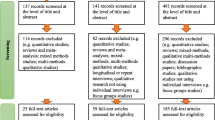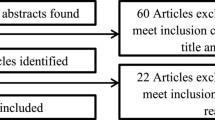Abstract
Previous research has identified twenty-six factors that may affect pregnancy management decisions following prenatal diagnosis of DS; however, there is no consensus about the relative importance or effects of these factors. In order to better understand patient decision-making, we conducted expansive cognitive interviews with nine former patients who received a prenatal diagnosis of DS. Our results suggest that patients attached unique meanings to factors influencing decision-making regardless of the pregnancy outcome. Nineteen of the twenty-six factors previously studied and four novel factors (rationale for testing, information quality, pregnancy experience, and perception of parenting abilities and goals) were found to be important to decision-making. We argue that qualitative studies can help characterize the complexity of decision-making following prenatal diagnosis of DS.
Similar content being viewed by others
Notes
All participants in our study received genetic counseling at the time of diagnosis, so this particular factor may not be relevant to our study.
References
ACOG Practice Bulletin 163: Screening for Fetal Aneuploidy. (2016). Retreived from http://www.acog.org/Resources-And-Publications/Practice-Bulletins-List.
Balkan, M., Kalkanli, S., Akbas, H., Yalinkaya, A., Alp, M. N., & Budak, T. (2010). Parental decisions regarding a prenatally detected fetal chromosomal abnormality and the impact of genetic counseling: an analysis of 38 cases with aneuploidy in Southeast Turkey. Journal of Genetic Counseling, 19(3), 241–246.
Beatty, P., Willis, G., & Schechter, S. (1997). Evaluating the generalizability of cognitive interview findings. In Seminar on statistical methodology in the public service: Statistical policy working paper 26 (pp. 353–362). Washington, DC: Survey Research Methods, American Statistical Association, 1142–1147.
Bell, M., & Stoneman, Z. (2000). Reactions to prenatal testing: reflection of religiosity and attitudes toward abortion and people with disabilities. American Journal of Mental Retardation, 105(1), 1–13.
Britt, D., Risinger, S., Miller, V., Mans, M., Krivchenia, E., & Evans, M. (2000). Determinants of parental decisions after the prenatal diagnosis of down syndrome: bringing in context. American Journal of Medical Genetics, 93(5), 410–416.
Bryant, L., Hewison, J., & Green, J. (2005). Attitudes towards prenatal diagnosis and termination in women who have a sibling with Down’s syndrome. Journal of Reproductive Infant Psychology, 23(2), 181–198.
Collins, D. (2003). Pretesting survey instruments: an overview of cognitive methods. Quality of Life Research, 12, 229–238.
Devers, P., Cronister, A., Ormond, K., Facio, F., Brasington, C., & Flodman, P. (2013). Noninvasive prenatal testing/ noninvasive prenatal diagnosis: the position of the National Society of genetic counselors. Journal of Genetic Counseling, 22(3), 291–295.
Drugan, A., Greb, A., Johnson, M. P., Krivchenia, E., Uhlmann, W., Moghissi, K., et al. (1990). Determinants of parental decisions to abort for chromosome abnormalities. Prenatal Diagnosis, 10(8), 483–490.
Evans, M., Sobiecki, M., Krivchenia, E., Duquette, D., Drugan, A., Hume, R., et al. (1996). Parental decisions to terminate/continue following abnormal cytogenetic prenatal diagnosis: “what” is still more important than “when”. American Journal of Medical Genetics, 61(4), 353–355.
Grubs, R., & Piantanida, M. (2010). Grounded theory in genetic counseling research: an interpretive perspective. Journal of Genetic Counseling, 19, 99–111.
Hawkins, A., Stenzel, A., Taylor, J., Chock, V., & Hudgins, L. (2013). Variables influencing pregnancy termination following prenatal diagnosis of fetal chromosome abnormalities. Journal of Genetic Counseling, 22, 238–248.
Hurford, E., Hawkins, A., Hudgins, L., & Taylor, J. (2013). The decision to continue a pregnancy affected by down syndrome: timing of decision and satisfaction with receiving a prenatal diagnosis. Journal of Genetic Counseling, 22, 587–593.
Korenromp, M., Page-Christiaens, G., van den Bout, J., Mulder, E., & Visser, G. (2007). Maternal decision to terminate pregnancy in case of down syndrome. American Journal of Obstetrics and Gynecology, 196(2), 149.e1–149.e11.
Lawson, K. (2006). Expectations of the parenting experience and willingness to consider selective termination for down syndrome. Journal of Reproductive and Infant Psychology, 24(1), 43–59.
Lawson, K., & Walls-Ingram, S. (2010). Selective abortion for down syndrome: the relation between the quality of intergroup contact, parenting expectations, and willingness to terminate. Journal of Applied Social Psychology, 40(3), 554–578.
Leung, T., Ching, C. M., Chang, J., Leung, T., Fung, T., & Lau, T. (2004). Attitudes towards termination of pregnancy among Hong Kong Chinese women attending prenatal diagnosis counselling clinic. Prenatal Diagnosis, 24(7), 546–551.
Levers, M. (2013) Philosophical paradigms, grounded theory, and perspectives on emergence. SAGE Open. 1–6. Accessed via http://sgo.sagepub.com/content/3/4/2158244013517243
Lippman, A. (1999). Embodied knowledge and making sense of prenatal diagnosis. Journal of Genetic Counseling, 8(5), 255–274.
Miller, K., Kepp, V., Wilson, S., & Padilla, J. (2014). Cognitive interviewing methodology. Hoboken: Wiley.
Perry, S., Woodall A. L., & Pressman, E. K. (2007). Association of Ultrasound Findings with Decision to Continue Down Syndrome Pregnancies. Public Health Genomics, 10(4), 227–230.
Polkinghorne, D. (2005). Language and meaning: data collection in qualitative research. Journal of Counseling Psychology, 52(2), 137–145.
Pryde, P., Drugan, A., Johnson, M. P., Isada, N. B., & Evans, M. (1993). Prenatal diagnosis: choices women make about pursuing testing and acting on abnormal results. Clinical Obstetrics and Gynecology, 36(3), 496–509.
Quadrelli, R., Quadrelli, A., Mechoso, B., Laufer, M., Jaumandreu, C., & Vaglio, A. (2007). Parental decisions to abort or continue a pregnancy following prenatal diagnosis of chromosomal abnormalities in a setting where termination of pregnancy is not legally available. Prenat Diagnosis, 27(3), 228–232.
Rapp, R. (2000). Testing women, testing the fetus: the social impact of amniocentesis in America. New York: Routledge.
Roberts, C., Stough, L., & Parrish, L. (2002). The role of genetic counseling in the elective termination of pregnancies involving fetuses with disabilities. Journal of Special Education, 36(1), 48–55.
Schechtman, K., Gray, D., Baty, J., & Rothman, S. (2002). Decision- making for termination of pregnancies with fetal anomalies: anal- ysis of 53,000 pregnancies. Obstetrics and Gynecology, 99(2), 216–222.
Shaffer, B., Caughey, A., Norton, M., et al. (2006). Variation in the decision to terminate pregnancy in the setting of fetal aneuploidy. Prenatal Diagnosis, 26(8), 667–671.
Sheets, K., et al. (2011). Practice guidelines for communicating a prenatal or postnatal diagnosis of down syndrome: recommendations of the National Society of genetic counselors. Journal of Genetic Couseling, 20, 432–441.
Thomas, G. (2014). Prenatal screening for Down’s syndrome: parent and healthcare practitioner experiences. Sociology Compass, 8(6), 837–850.
Verp, M., Bombard, A., Simpson, J., & Elias, S. (1988). Parental decision following prenatal diagnosis of fetal chromosome abnor- mality. American Journal of Medical Genetics, 29(3), 613–622.
Willis, G. (1999). Cognitive interviewing: a “how to” guide. Research Triangle Institute. 1999 Meeting of the American Statistical Association. Research Triangle Park, NC: Research Triangle Institute.
Willis, G. (2005). Cognitive interviewing: a tool for improving questionnaire design. London: Sage.
Zlotogora, J. (2002). Parental decisions to abort or continue a pregnancy with an abnormal finding after an invasive prenatal test. Prenatal Diagnosis, 22(2), 1102–1106.
Acknowledgements
This study was conducted in preparation for the 2013 Jane Engelberg Memorial Fellowship. The authors wish to thank Blythe G. Crissman for her contributions to the study design.
Author information
Authors and Affiliations
Corresponding author
Ethics declarations
Ethical Approval
This study received research ethics approval from the Duke University Institutional Review Board (Protocol #00033303).
Conflict of Interest
The authors declare no potential conflicts of interest with respect to the research, authorship, and/or publication of this article.
Human Studies and Informed Consent
All procedures followed were in accordance with the ethical standards of the responsible committee on human experimentation (institutional and national) and with the Helsinki Declaration of 1975, as revised in 2000 (5).
Animal Studies
No animal studies were carried out by the authors for this article.
Rights and permissions
About this article
Cite this article
Reed, A.R., Berrier, K.L. A Qualitative Study of Factors Influencing Decision-Making after Prenatal Diagnosis of down Syndrome. J Genet Counsel 26, 814–828 (2017). https://doi.org/10.1007/s10897-016-0061-8
Received:
Accepted:
Published:
Issue Date:
DOI: https://doi.org/10.1007/s10897-016-0061-8




